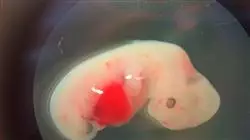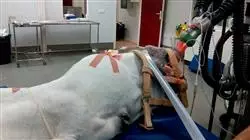University certificate
The world's largest faculty of veterinary medicine”
Introduction to the Program
This Postgraduate Certificate 100% online and will enable you to combine your studies while increasing your knowledge in this field”

Cardiovascular disorders in animals are highly significant because they can affect their quality of life and life expectancy. Advanced knowledge of Cardiology is an indispensable area of knowledge for large animal veterinarians: Ruminants (Cattle, Sheep, Goats), Camelids (Alpacas, Camels and Llamas), Suids (Pigs, Boars) and Equidae (Donkeys and Mules).
Cardiology in ruminants and swine has been limited for a long time due to the limited literature and diagnostic limitations, especially in advanced therapeutic procedures.
Regarding Equidae, a high number of horses are used for sporting purposes and cardiac pathologies limit their capacity and even force the animal to withdraw from competition. This is more evident the more athletic demand and cardiovascular effort the equine has. The management of food species differs, but it also affects their production capacity.
In recent years, there has been a boom in the development of novel diagnostic and therapeutic techniques, such as intracardiac electrocardiograms, electrophysiological mapping in arrhythmias, pacemaker implantation and other intracardiac devices that can be implemented in larger species. These advances, which are necessary for an adequate clinical approach, are not available in books.
Therefore, this Postgraduate Diploma offers a comprehensive and well-developed syllabus that addresses advanced cardiology topics, providing detailed descriptions of the different procedures performed depending on the species, as well as a guide for clinical decision-making and patient selection.
This program covers the basics of Cardiology and delves into the most up-to-date and advanced techniques currently available, offering extensive and in-depth content.
The Postgraduate Diploma in Cardiac Pathophysiology in Large Animals brings together all the detailed information on the different fields of Cardiology at a high and advanced level of specialization and is taught by renowned professors in the field of internal medicine, cardiology and minimally invasive surgery in veterinary medicine.
Learn Identify all clinical signs associated with cardiovascular overtraining and undertraining"
This Postgraduate diploma in Cardiac Pathophysiology in Large Animals in Large Animals contains the most complete and up-to-date educational program on the market. The most important features of the program include:
- Development of practical cases presented by experts in Cardiac Pathophysiology in Large Animals
- The graphic, schematic, and practical contents with which they are created, provide scientific and practical information on the disciplines that are essential for professional practice
- Latest developments in Cardiac Pathophysiology in Large Animals
- Practical exercises where self-assessment can be used to improve learning
- Special emphasis on innovative methodologies in Cardiac Pathophysiology in Large Animals
- Theoretical lessons, questions to the expert, debate forums on controversial topics, and individual reflection assignments
- Content that is accessible from any fixed or portable device with an Internet connection
This Specialist Diploma is the best investment you can make when choosing a refresher program to update your existing knowledge of Veterinary Cardiology"
The multimedia content, developed with the latest educational technology, will provide the professional with situated and contextual learning, i.e., a simulated environment that will provide immersive training programmed to train in real situations.
This program is designed around Problem Based Learning, whereby the specialist must try to solve the different professional practice situations that arise during the academic year. For this purpose, the professional will be assisted by an innovative interactive video system created by renowned and experienced experts in Cardiac Pathophysiology in Large Animals.
This specialisation comes with the best didactic material, providing you with a contextual approach that will facilitate your learning"

Veterinarians must continue their training to adapt to new developments in this field"
Why study at TECH?
TECH is the world’s largest online university. With an impressive catalog of more than 14,000 university programs available in 11 languages, it is positioned as a leader in employability, with a 99% job placement rate. In addition, it relies on an enormous faculty of more than 6,000 professors of the highest international renown.

Study at the world's largest online university and guarantee your professional success. The future starts at TECH”
The world’s best online university according to FORBES
The prestigious Forbes magazine, specialized in business and finance, has highlighted TECH as “the world's best online university” This is what they have recently stated in an article in their digital edition in which they echo the success story of this institution, “thanks to the academic offer it provides, the selection of its teaching staff, and an innovative learning method aimed at educating the professionals of the future”
A revolutionary study method, a cutting-edge faculty and a practical focus: the key to TECH's success.
The most complete study plans on the university scene
TECH offers the most complete study plans on the university scene, with syllabuses that cover fundamental concepts and, at the same time, the main scientific advances in their specific scientific areas. In addition, these programs are continuously being updated to guarantee students the academic vanguard and the most in-demand professional skills. In this way, the university's qualifications provide its graduates with a significant advantage to propel their careers to success.
TECH offers the most comprehensive and intensive study plans on the current university scene.
A world-class teaching staff
TECH's teaching staff is made up of more than 6,000 professors with the highest international recognition. Professors, researchers and top executives of multinational companies, including Isaiah Covington, performance coach of the Boston Celtics; Magda Romanska, principal investigator at Harvard MetaLAB; Ignacio Wistumba, chairman of the department of translational molecular pathology at MD Anderson Cancer Center; and D.W. Pine, creative director of TIME magazine, among others.
Internationally renowned experts, specialized in different branches of Health, Technology, Communication and Business, form part of the TECH faculty.
A unique learning method
TECH is the first university to use Relearning in all its programs. It is the best online learning methodology, accredited with international teaching quality certifications, provided by prestigious educational agencies. In addition, this disruptive educational model is complemented with the “Case Method”, thereby setting up a unique online teaching strategy. Innovative teaching resources are also implemented, including detailed videos, infographics and interactive summaries.
TECH combines Relearning and the Case Method in all its university programs to guarantee excellent theoretical and practical learning, studying whenever and wherever you want.
The world's largest online university
TECH is the world’s largest online university. We are the largest educational institution, with the best and widest online educational catalog, one hundred percent online and covering the vast majority of areas of knowledge. We offer a large selection of our own degrees and accredited online undergraduate and postgraduate degrees. In total, more than 14,000 university degrees, in eleven different languages, make us the largest educational largest in the world.
TECH has the world's most extensive catalog of academic and official programs, available in more than 11 languages.
Google Premier Partner
The American technology giant has awarded TECH the Google Google Premier Partner badge. This award, which is only available to 3% of the world's companies, highlights the efficient, flexible and tailored experience that this university provides to students. The recognition as a Google Premier Partner not only accredits the maximum rigor, performance and investment in TECH's digital infrastructures, but also places this university as one of the world's leading technology companies.
Google has positioned TECH in the top 3% of the world's most important technology companies by awarding it its Google Premier Partner badge.
The official online university of the NBA
TECH is the official online university of the NBA. Thanks to our agreement with the biggest league in basketball, we offer our students exclusive university programs, as well as a wide variety of educational resources focused on the business of the league and other areas of the sports industry. Each program is made up of a uniquely designed syllabus and features exceptional guest hosts: professionals with a distinguished sports background who will offer their expertise on the most relevant topics.
TECH has been selected by the NBA, the world's top basketball league, as its official online university.
The top-rated university by its students
Students have positioned TECH as the world's top-rated university on the main review websites, with a highest rating of 4.9 out of 5, obtained from more than 1,000 reviews. These results consolidate TECH as the benchmark university institution at an international level, reflecting the excellence and positive impact of its educational model.” reflecting the excellence and positive impact of its educational model.”
TECH is the world’s top-rated university by its students.
Leaders in employability
TECH has managed to become the leading university in employability. 99% of its students obtain jobs in the academic field they have studied, within one year of completing any of the university's programs. A similar number achieve immediate career enhancement. All this thanks to a study methodology that bases its effectiveness on the acquisition of practical skills, which are absolutely necessary for professional development.
99% of TECH graduates find a job within a year of completing their studies.
Postgraduate Diploma in Cardiac Pathophysiology in Large Animals
.
Immerse yourself in the fascinating field of cardiac pathophysiology in larger species through our Postgraduate Diploma program at TECH Global University. Discover the complexities of the cardiovascular system in larger animals and gain the knowledge you need to understand and address cardiac disease in these species, all from the comfort of your home with our online classes. Cardiac disease is a major concern in animals of larger species, such as horses, cows and other farm animals. As an expert in cardiac pathophysiology in larger species, you will be prepared to meet the unique challenges associated with the diagnosis and treatment of these diseases. Your expertise will be of great value to animal owners and veterinary professionals engaged in the care of these species.
Update your knowledge and bring peace of mind to animals and their owners
.
Our Postgraduate Diploma program in Cardiac Pathophysiology in Large Animal will give you the specialized knowledge you need to excel in this field. You will learn about the cardiac anatomy and physiology of larger species, as well as the major cardiac diseases that affect these animals. You will become familiar with the diagnostic methods and treatment options available, including pharmacotherapy and surgical procedures. By choosing our online classes, you will enjoy a number of notable benefits. You will have access to quality educational material, taught by experts in cardiac pathophysiology in larger species. Our hands-on approach will allow you to apply your knowledge through case studies and practical exercises. In addition, you will have the flexibility to study at your own pace, adapting your learning to your schedule and personal commitments. TECH prides itself on offering innovative and quality programs, backed by our reputation as a leading institution in online education. Join us in the Postgraduate Diploma in Cardiac Pathophysiology in Large Animals and gain the skills you need to excel in the field of veterinary cardiology in large animals, contributing to the well-being and health of these species.







